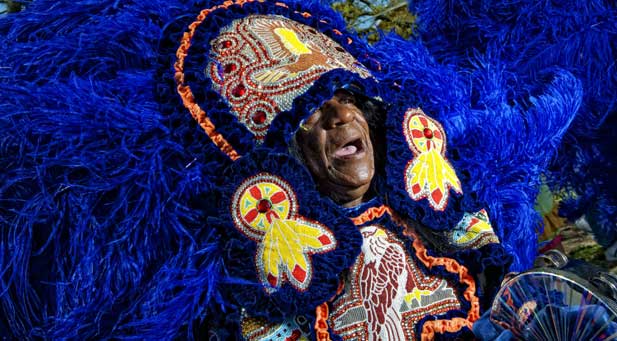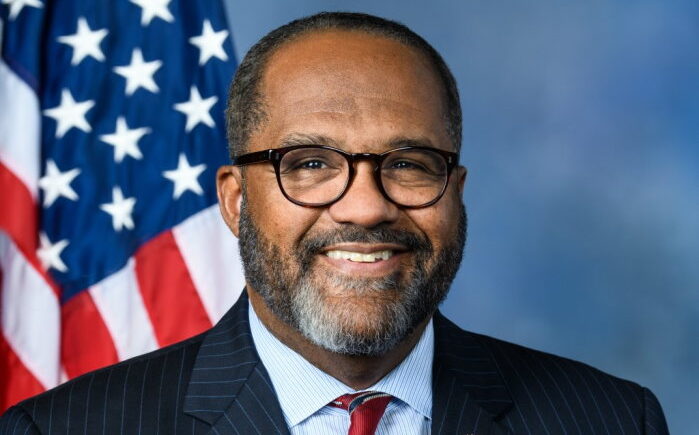
Born in New Orleans, Big Chief Monk is the Big Chief of the Golden Eagle Tribe, coming out of uptown Valance and Freret St. area. Chief is one the oldest and most respected chiefs, keeping the purity of the traditions and culture that has been passed down to him by his father. As he told us “that’s the right way!”
Tribe Timeline:
From 1956-present/ Big Chief Joseph “MONK” Boudreaux/ The Golden Eagles
From 1930’s- 1956/ Raymond Boudreaux-The Wild Squawtoulas
From 1900’s / Clarence Boudreaux- / Hidden- did not mask in public
1) What was your family’s tradition of Black Masking or your earliest memories of Masking?
My grandfather didn’t mask but was a part of a tribe. My dad masked under the Wild Squatoulous in Forty-Six. Way back they had different tribes the red white and blue and the 101! It’s been going on since the 1700s. It was secretive (because of the Code Noir of 1726) so my grandfather didn’t talk about it. Back then they hide things, they had their own language and they didn’t teach it to us because they had a reason for that. I think the reason was because they were dark skin and passing for Black so they wouldn’t have to go to the reservations. That’s why they had this hidden language they were doing and didn’t want us to know so we wouldn’t let the cat out the bag. I didn’t know my mother knew it until one night at a party I heard her speaking to an old friend (in the old language).
2) How did you get started in Black Masking Tradition?
A) When I was kid (about 5 years old) my dad masked and we would help dress him at 4:30 a.m. and he would go out and we would wait till he came back. The Indians where I came from was where the base of the uptown Indians would come out. I always wanted to be an Indian, like my dad, but didn’t know what to do. But, then, I found out: You had to sew to be an Indian. When I was 12 to 13, I started. Once I started I couldn’t stop.
3) Truth about the Black Indigenous Masking cultures’ origin?
A) I got some paperwork, I had a friend of mine a professor do some research and found we been here for a long time, some of the first people. I do my research because I know when I speak to people I want to tell the truth about our culture, some don’t cause they don’t know so I straighten them out. They have different opinions of where we came from. Some even say a Buffalo Bill Show (Wild West) came down here and that’s what started it… (Wild chuckle).
4) Old culture compared to today’s culture?
A) I come from the old-style cause that’s the way I was taught. That’s the right way. I’m not trying to beat nobody, when I leave here, I’m doing it for me. If I think I’m pretty? I’m pretty…. ya hear me! Now he may not think I’m pretty but I don’t have nothing to do with his feelings (big laugh) about me? But I know I’m pretty because I put the time in. I’ll sit down till I sew a portion, I sew in portions, and I look after two three hours. Once I see how far I got I know how far I got to go before I catch up with other portions and before you know it I’m done.
5) How was Masking during segregation? Late 50s early 60s
A) Well, Mardi Gras Day we didn’t have a problem unless there was a fight broke out and they would say that’s the Indians cause we were in that area. Put it on the Indians. Now St. Joseph Night they tried to break that up. By putting us in jail. Well they didn’t catch me. Because I was young. The younger guys didn’t get caught but the older guys got caught and went to jail with their Indian suit on and the judge said to the police never bring them in here no more, cause that’s they culture. That’s what stopped that. That was in the 60s or late 50s.
6) Why do Indians use signals?
A) We didn’t have any problems with Mardi Gras unless there was a fight and they would put it on the Indians. That’s why we had signals, because we could be three blocks away from the chief and were in front and we had signals. If we see trouble we could stop and throw a signal back and let chief know they got trouble ahead, turn around. Cause if we go into that, that’s gone be our trouble cause they gone say it’s the Indians. That’s why we had signals, the youngsters today don’t know that. Now when you meet a tribe now they all piled up together. We didn’t do that, man the chief would be way in the back. That’s why we had spy boy, flag boy, spy boy, flag boy, spy boy, flag boy and gang flag and we were that far apart but we knew if we saw trouble how we could get that signal back. The most important thing about playing that position, you had to be able to pay attention. Once that signal come to you, you have to relay that message back to the chief. Like I say the worst Indian is a drunken Indian!..ha ha ha
7) What does the police/City do for the Black Masking Indians?
A) they block off the streets for us, when you have 50 Indians coming in on one block and people trying to get by, but what I know about that is, they have people that want to ride and see the Indians but that’s what cause the traffic so the police block it off for us and the neighborhood would be ours till midnight.
8) How would the City be without Indians?
A) We are part of the City, like I say we were a hidden culture for a long time, now the whole world knows about us and they come down to see us. Now you say how it would be without the Indians…Ha-ha-ha…I don’t know what that would look like…
9) Chief in next Tricentennial, when your tribe look back to now, how would you want them to remember you?
As a great man like my father was…I taught it and I taught it well! Like I was taught.
Recommended For You.



Be the first to comment